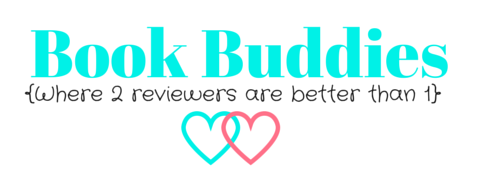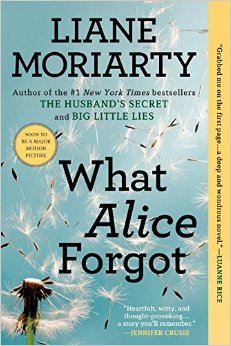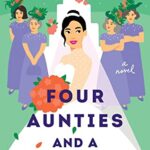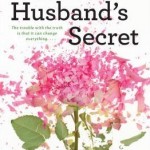 Cristina and Lauren Read:
Cristina and Lauren Read:
 What Alice Forgot by Liane Moriarty
What Alice Forgot by Liane Moriarty Also by this author: The Husband's Secret
Published by Berkley on April 24th 2012
Pages: 466 •Goodreads

Alice Love is twenty-nine, crazy about her husband, and pregnant with her first child. So imagine Alice’s surprise when she comes to on the floor of a gym (a gym! She HATES the gym) and is whisked off to the hospital where she discovers the honeymoon is truly over — she’s getting divorced, she has three kids, and she’s actually 39 years old. Alice must reconstruct the events of a lost decade, and find out whether it’s possible to reconstruct her life at the same time. She has to figure out why her sister hardly talks to her, and how is it that she’s become one of those super skinny moms with really expensive clothes. Ultimately, Alice must discover whether forgetting is a blessing or a curse, and whether it’s possible to start over…
*Kirkus Reviews
Book Buddies is a discussion style review I participate in every other month with my friend Lauren who runs the blog Bookmarklit. We choose a themed book for the month, read it, and the have a discussion where we both discuss themes and aspects that really stood out to us. Book Buddy Reviews are posted during the last week of the month.You can see our review in a Q&A format with half posted here, and half on Lauren’s blog!
1) Throughout the book, the impression is given that “Old Alice,” the 29 year old version of herself without 10 years of memories, is much preferable to the “New Alice,” the 39 year old she has grown to be. Do you think that there was too much polarization between one being more likable and ultimately more preferable than the other?
C: I definitely think that there was too much of a delineation between “Old Alice” (aka “Good Alice) and “New Alice” (aka “Bad Alice”). Everyone who she seems to be on the outs with relaxes toward her once they learn that she believes she is 29 again, and I think rather than that Alice being kinder all the time, it may have more to do with the fact that they can erase 10 years of drama and ugly memories with the person and start anew. While there’s definitely traits that “Old Alice” had that “New Alice” seemed to have lost (her enthusiasm and adoration of her marriage, her naivety, her flaky charm) I think that “New Alice” also had traits that should be positive as well (she’s confident, authoritative, organized, and involved with her children’s lives). I think the book sort of romanticized this notion of being 29 again, and I think your 30s are a decade of huge transition and coming out of that different or jaded isn’t necessarily surprising or unique. I just wish everyone hadn’t been so hard on “New Alice” when, you know, they were all 10 years older with 10 years worth of mistakes under their belts as well.
L: I totally agree. To be honest, it seemed a bit unrealistic that Old Alice would be so different from New Alice. I know that 10 years is a long time to change, but there was such a stark difference. Absolutely. You make some great points! I think that’s a really good point. The Old Alice was seen as a flaky, easygoing person who believed in her marriage and was looking forward to the future. The New Alice was more bitter towards everything and had a negative vibe around her. Maybe this is more noticeable because we’re in Alice’s head and see how SHE is reacting to herself. But, you’re right – New Alice has some wonderful qualities, like putting her children first and focusing on them. Being younger than 30 seems so desirable in our culture, but there’s a lot to be said for mothers and people who are nearing middle-age. Getting older IS something you can’t avoid. I know I would be completely shocked if I woke up without 10 years of memories and mistakes, but I was a LOT different at 14 compared to 24 (and would be at 34, I guess)! That’s a big transition period as well, between high school, college, and graduating into the real world.
2) Comparing this book to Liane’s other books, such as The Husband’s Secret, it seems that a common trope that comes up is that of the “busybody” housewife who is the perfect mother on paper, yet is really quite unsatisfied in real life (such as Celia). Do you think that Liane is undermining the roles of her characters as wives and mothers in this sense?
C: I come from a family where no one is a “stay at home mom” (nor ever was), but I actually find that I quite admire characters like Celia, and Alice to a lesser extent, for breaking the stereotypes of stay at home moms as meddlesome, lazy, or lacking skills. They have extraordinary talent that they channel through more domestic means. However, I find that the characters who are often portrayed as ultimately “happier” are those who are in more unconventional family situations (such as Tess from The Husband’s Secret (sort of a single working mom), or even Franny, who was never a mother or wife at all). I haven’t read any of Moriarty’s other books yet, so perhaps this isn’t a super common trope and was more coincidental. Reading them only a few weeks apart, it’s something that really stood out to me!
L: Ah, I want to reread The Husband’s Secret so much now. I never really thought about it before, but it’s so true. It’s like the housewives of the world are ALL secretly unhappy with their lives. This is definitely not true. I’m sorry to say that you will see the same kind of thing show up in Big Little Lies, another book I read by her. (I actually predicted a lot about that particular book, so I didn’t enjoy it as much, but it’s still worth the read!) There are lots of talents that stay-at-home moms have and I don’t think they get enough credit. It’s nice to see Moriarty show that these women who don’t necessarily have careers are still very organized and thrifty. I love that. But it does seem like she undermines them at the same time, showing that none are truly happy until they get back to work.
3) Throughout the novel the theme of childbearing plays a pivotal role. There’s Alice, with 3 children yet a marriage that’s on the rocks, Elizabeth, who tries again and again to conceive with the undying support of her husband, and Franny, who is the “adopted” grandmother of Alice and Elizabeth who writes letters to a long-ago lover. Do you think there’s any correlation between the characters’ relationships with their children (and lack thereof) and their romantic relationships?
C: I think that this book sort of takes an interestingly inverse view of the popular idea that children= fulfillment. “New Alice” is obviously lacking happiness in her life and marriage, and she has had 3 easy pregnancies and a house full of children. Meanwhile, Elizabeth has had something like 7 failed IVF attempts and while dealing with severe emotional issues of her own because of it, has a husband who really seems to adore and support her (even if she’s cynical about the fact and doesn’t know it). I think Franny is actually the POV character with perhaps the most peace in life, and she’s the one who was never able to live out her domestic and family aspirations, yet has the closest relationship with her surrogate “grandchildren,” Elizabeth and Alice. I think this book really puts the emphasis on being able to choose families and choose relationships that are important to you and making them matter, rather than the ones that you are able to biologically create.
L: There is a LOT of emphasis on having families and kids in this book. Frannie is definitely the most balanced person of them all but I can’t decide if it has to do with kids or not. I like what you said about putting emphasis on “chosen” families instead of biological ones. But in some ways, there are some mixed messages about how having kids means your life is fulfilled and perfect. New Alice isn’t super happy but she loves her kids, so she works hard to keep them going. Elisabeth has issues with having kids and has had many unfortunate miscarriages, but her husband is still supportive. Frannie “adopts” their family as her own and is very happy. The one I struggle with is Elisabeth. She tried so hard for years to have children and SPOILER AHEAD ends up successfully having a child at the end of the book. It really seemed like she wasn’t going to be happy until she had a child. I know there are some people who desperately want kids and can’t have them, so this book will hit home for them. But, it felt like the message was that having children WILL make you happy – biological or not. If Elisabeth ended the book without having kids or even adopting any, would she have been happy? Would she have come out of her funk within the timeframe of the story?
4) Alice loses ten years of her memory in the year 2008, awakening with the mentality that it’s still 1998. While ten years is a lot of time to have erased from her memory, do you feel it was exacerbated by having the time be split across the new millennium?
C: I think that splitting the time loss across the “Y2K” was purposeful and effective, more so than, say, 1989-1999 or 2006-2016. I remember there was such a panic back then about what would happen when year 2000 rang in (weren’t all the computers supposed to freak out and crash?) and there was so much hype surrounding it. Once everyone realized the apocalypse wasn’t going to happen, everyone got super excited and started embracing major changes in technology that happened between ’98-’08 (think about it, you jump from cassette tapes to like the iPod touch, VHS to On Demand and Netflix, etc.). I found it so funny when Alice awakens in the hospital and is marveling at her cell phone, because it really makes you realize how many huge changes we’ve encountered in such a short period of time, and that the seemingly “outdated” things existed in abundance when you were still alive.
L: Definitely. Like I said in my first answer, I can’t imagine losing 10 years like that. I was a different person between ages 14 and 24 and will probably be even more different by 34. I truly can’t imagine my personality changing, but I definitely can see my life (and hopefully my job!) being very different. Going across the millennium was huge (I totally remember exactly what I did that New Years – so much panic!). She woke up and had a complicated cell phone, Facebook, and just an entirely different computer/online situation. I read a really interesting article the other day where someone explains how our generation is more nostalgic than any other because we’ve encountered the most changes in such a short amount of time. The internet really got going when we were young, and things have evolved SO much since then. I don’t even know what we’ll have in another 10 years!
5) What Alice Forgot explores a theme that’s often prevalent in YA, toxic (or at least questionable) female friendships. As the book progresses and the readers learn more about Alice’s friendship with Gina, it becomes clear that the friendship was a catalyst for change in many aspects of Alice’s life, especially her marriage. Do you think that too much blame on Alice’s negative traits she has when she’s 39 is to be blamed on this friendship?
C: You know, I really didn’t like the whole Gina plot line, just because it really felt like it didn’t fit in with the rest of the story. Alice already had so many interesting family dynamics that for her to be completely changed and manipulated by a newcomer to the neighborhood just didn’t seem realistic to me. That being said, I really found that I hated Gina, but I also wondered if I hated her too easily- that it was the classic “manipulative woman” stereotype being used as a plot device to scapegoat why Alice became “unlikable” in her 30s (and why her marriage fell apart). I wish Gina had been more fleshed out as a character, through flashbacks perhaps, so I could get more of a sense of her, since her shadow really loomed over the entire book (and no one really wanted to talk about her, so she really acted like a “plot-hole ghost” in my opinion).
L: Interesting! I think Gina was definitely used as a catalyst for Alice’s change and I think it was fairly well done. I do have to say that Alice probably would have made some of the same changes in her life without Gina, though. If her husband worked long hours suddenly and was less focused on the family, Alice could have easily ended up in the same position (sans Gina). However, the weight loss/fitness routine and other things were courtesy of Gina. I think a lot of the elements of her friendship seemed toxic, but I can also relate. Sometimes I feel like I become a “different” person with certain friends – I adopt their language styles and we fall into old inside jokes immediately, when I otherwise may not talk like that. I know Gina/Alice were more extreme than that because they were constantly with each other, but still – I thought some of it made sense. It was irritating to wonder throughout the entire book who Gina was and why she was such a big deal. It actually made me feel bad for Nick more than anyone; his wife was slowly becoming someone he didn’t recognize, and Alice projected all of Gina’s marital problems and insecurities on her own marriage. So, I will say that it was mostly realistic to me… but I don’t like that the manipulative woman stereotype was used yet again. It could have been done differently, for sure! One more quick thing, now that I’m thinking about it – the whole “mystery” of Gina (plus Alice’s entire 10 years) is reminiscent of the two other Moriarty books I’ve read. Even if they all read as contemporary/women’s fiction, there is a nice mystery element in each of them. Sometimes the mystery is larger (Big Little Lies) and sometimes it’s smaller (this story), but it always keeps me interested in continuing to read.
Continue reading the second half of our discussion on Lauren’s blog here!
Overall Thoughts:
After reading The Husband’s Secret, What Alice Forgot was a bit disappointing for me. While the premise was extremely interesting, the first half of the book dragged with a lot of unnecessary narratives by characters other than Alice. The book also called upon some tropes that seem to be used commonly throughout Moriarty’s other works, and it’s a bit disappointing to see that lack of variety. However, the writing was solid and it’s a fascinating enough concept to make me glad to have read it.
Reading this book contributed to these challenges:
- Backlist Book Challenge 2016
- Goodreads Challenge 2016
- Rock My TBR 2016

















I have yet to read a Liane Moriarty book! But based on this discussion that you two have shared with us (I’m going to read Lauren’s in a little bit), I’m really interested. I feel like it would be so cool to be able to go into it thinking about all of the stuff that you ladies have discussed here, particularly when it comes to the characters. As always, thank you for sharing such a fascinating discussion!
Thank you for the lovely comment, Alexa! I kept hearing Liane’s name everywhere so I’ve decided to read some of her bigger titles this year. While I enjoyed The Husband’s Secret more than this novel, both are great character driven novels with a “contemporary” mystery at their core, and epilogues that really surprise the reader!